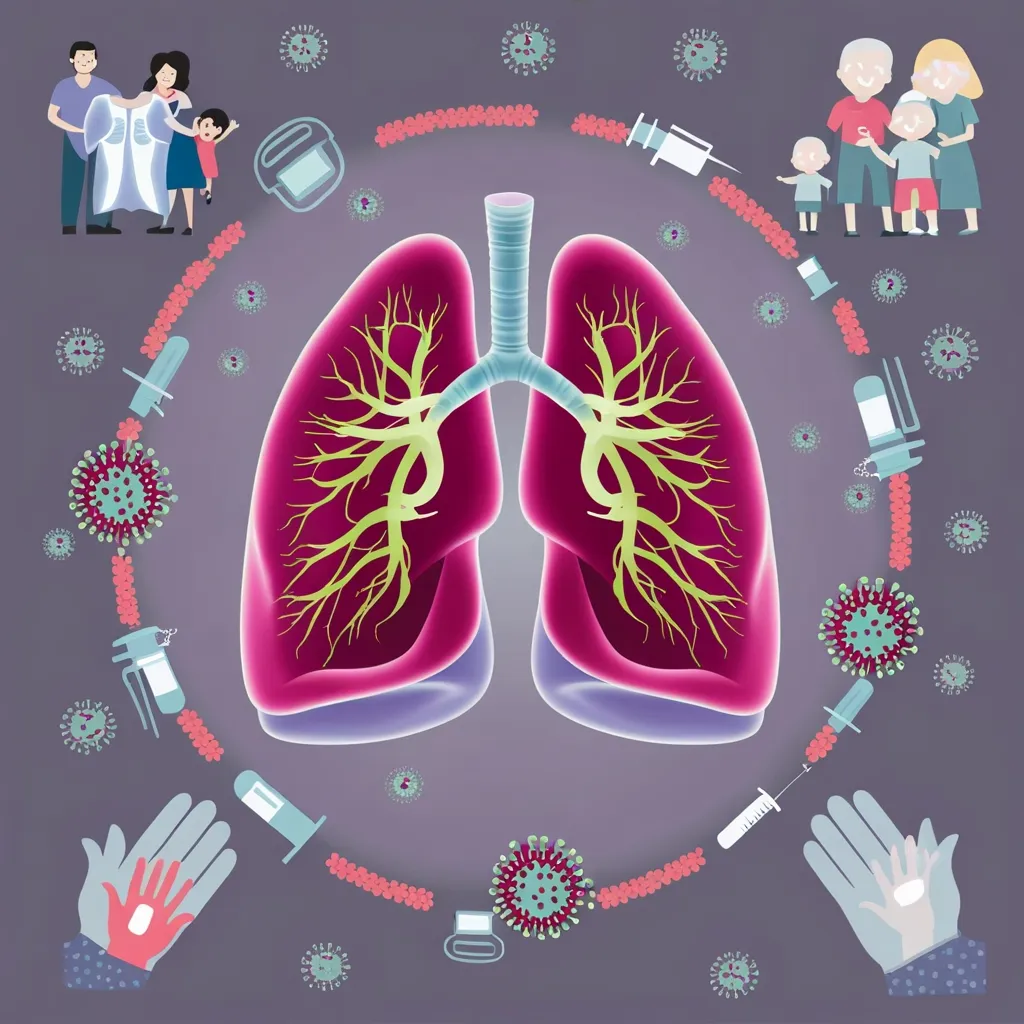Pneumonia is one of those words you hear thrown around, especially during cold and flu season, but what exactly is it? Well, it’s a nasty lung infection that can be caused by different kinds of germs, either bacteria or viruses. Now, it’s not picky; it can affect anyone. But it’s particularly dangerous for the little ones, the older folks, and those whose immune systems aren’t in tip-top shape.
So, how does pneumonia come about? Basically, when those pesky germs manage to sneak into your lungs, they set up shop and start causing trouble. Bacterial pneumonia often gets its start from Streptococcus pneumoniae, while viral pneumonia might arise from the flu virus, RSV, or even something like the infamous SARS-CoV-2 (hello, COVID-19).
People with compromised immune systems are particularly vulnerable to pneumonia. We’re talking about individuals with conditions like HIV/AIDS, those undergoing chemotherapy, or folks who’ve had organ transplants. And let’s not forget other risk factors like smoking, heavy drinking, or having conditions like asthma, diabetes, or heart disease.
When it comes to symptoms, pneumonia can be all over the place depending on the culprit and your overall health. The top contenders are a nagging cough that might bring up mucus—or even bloody mucus—fever, chills that make you shiver, and trouble catching your breath. You might also experience sharp chest pain, especially when you try to take a deep breath or cough. Then there’s the sweating, headaches, loss of appetite, and just plain feeling wiped out. For older adults, confusion can be a telltale sign, while babies might seem unusually tired, fussy, or have trouble breathing.
So, how do you know if you have pneumonia? Typically, a healthcare provider will listen to your lungs with a stethoscope, searching for any strange sounds that might indicate fluid in the lungs. A chest X-ray is often the go-to for a definitive diagnosis. If the situation is a bit murky, they might also order blood tests or a sample of mucus from your lungs to get a clearer picture.
Treatment varies depending on whether you’re dealing with bacteria or a virus. For bacterial pneumonia, antibiotics are your best friend, but it’s crucial to take the full course, even if you start feeling better. Stopping early could mean the infection makes a dreaded comeback, and the bacteria might become resistant to antibiotics. Viral pneumonia, however, gives antibiotics the cold shoulder. The focus here is more on nursing you back to health: rest, fluids to clear the mucus, and meds to bring down that fever. Sometimes, antivirals are prescribed to help combat the infection.
Recovering from pneumonia takes time—think weeks or even months. It’s essential to follow your treatment plan to the letter and adopt healthy practices. That means plenty of rest, staying hydrated, sipping on warm drinks, maybe using a humidifier to make breathing easier, and avoiding smoky or cold environments.
To prevent pneumonia in the first place, a few key steps can make a world of difference. Vaccinations are super effective against certain types of pneumonia. The flu shot can ward off flu-related pneumonia, and the COVID-19 vaccine can help prevent severe cases related to SARS-CoV-2. There are also specific vaccines like PCV13 and PPSV23 for bacterial pneumonia, recommended for high-risk groups such as young kids and older adults.
Practicing good hygiene is a cornerstone of prevention. Frequent hand washing, especially after being around someone sick, is essential. Keeping your distance from those who are ill and avoiding crowded places can also help, particularly if your immune system isn’t in the best shape.
Even though many pneumonia cases can be handled at home, some can spiral into serious problems like respiratory failure, liver failure, or heart failure. If symptoms take a turn for the worse, like severe chest pain, difficulty breathing, or coughing up blood, it’s time to seek medical help immediately. During recovery, if any new symptoms pop up or old ones intensify, calling your healthcare provider is the way to go. Keeping a close eye on your condition and sticking to your treatment plan can ward off complications.
Living a lifestyle that promotes lung health can go a long way in preventing pneumonia. Quitting smoking is a significant step as smoking hinders your lungs’ ability to fend off infections. Eating a balanced diet packed with fruits, veggies, and essential nutrients helps keep your immune system strong. Regular exercise and plenty of sleep bolster overall health and help you fend off infections. Steering clear of excessive alcohol and managing any chronic health conditions can further lower the risk.
To sum it all up, pneumonia is a serious illness that demands prompt attention and careful management. Knowing its causes, symptoms, and treatment options, along with taking preventive measures and living a healthy lifestyle, can greatly reduce your risk and ease the impact of this infection. By doing all this, you can take charge of your lung health and ensure a quicker, more thorough recovery if pneumonia ever comes knocking.






